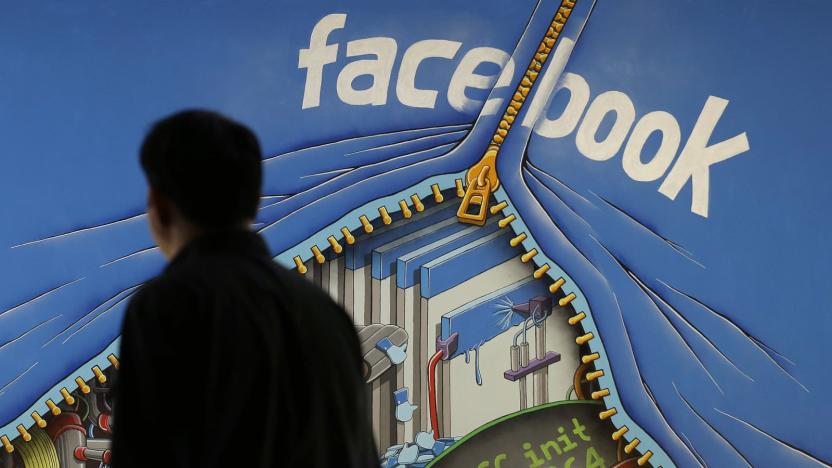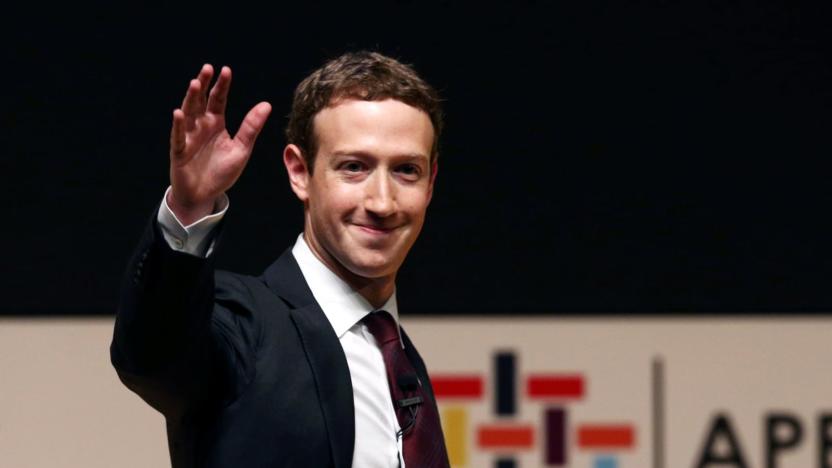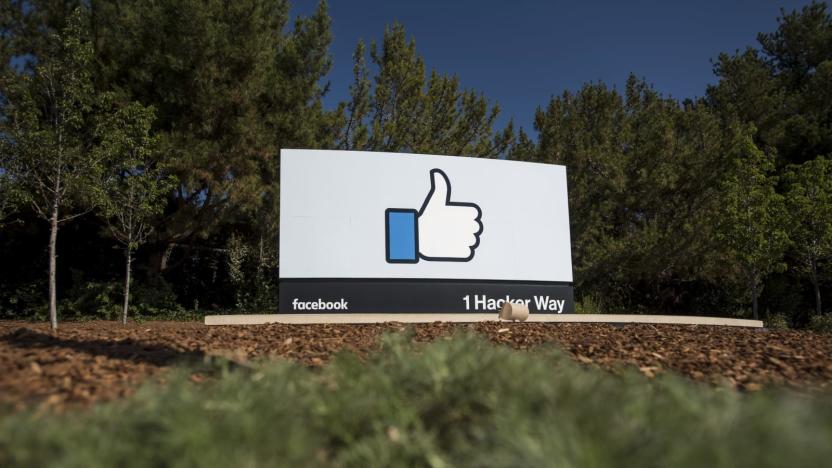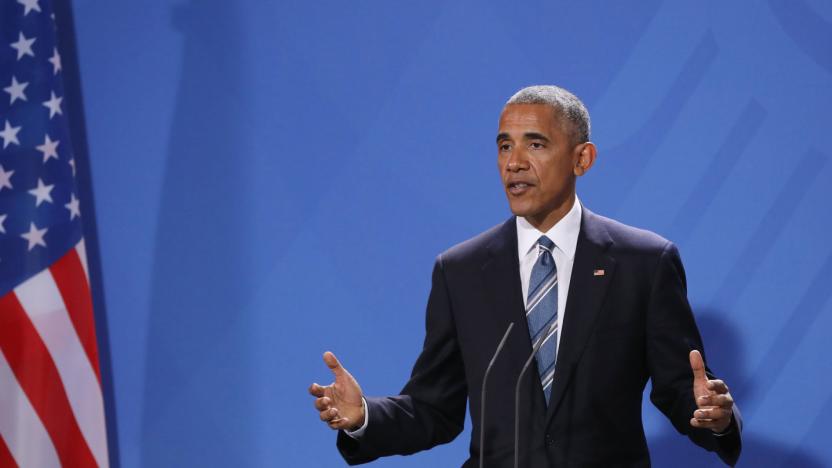fakenews
Latest

Facebook is using third-party fact-checkers to fight fake news
Last month, Facebook CEO Mark Zuckerberg previewed a number of steps the social network would take to combat fake news. Today, the company provided an update on the initiative which starts by making it easier to report a hoax. You can report what you think might be a fake news story by clicking in the top right corner of the post. If enough people do just that, Facebook will send the link to a third-party fact-checker to determine if it really is fake.

Facebook adds a 'fake news' reporting option (updated)
Facebook has been getting dragged hard since November 8th -- and rightfully so -- given the unprecedented amount of shitposts and fake news that dominated the social site in the months leading up to the election. After his initial defense of "nuh-uh, wasn't us" fell on deaf ears, Facebook CEO Mark Zuckerberg has decided to do something about it. The company has begun hitting fake news sites in the wallet, as well as scrubbing BS content through both curation and automation. And, on Sunday, Facebook appears to have quietly rolled out a third method: a new user-reporting feature that specifically calls out fake news for what it is. Update: Turns out that the false news option has been active on the site since last year.

Facebook patent hints at an automated solution for fake news
Facebook may have said that it's stepping up its fight against fake news in the past few weeks, but there are signs that it might have had a way to tackle this problem sooner. A recently published USPTO filing from 2015 reveals that Facebook has applied for a patent on technology that would automate the process of removing "objectionable content." It's ostensibly for eliminating hate speech, porn and other material that Facebook has objected to for years, but the system could easily be applied to bogus stories as well.

Facebook is asking users' help to ID misleading news
The latest addition to Facebook's never-ending parade of experimental features looks like it's all about fake news. Chris Krewson, an editor for Philadelphia publication Billy Penn, has spotted a survey module right underneath a post by the Philadelphia Inquirer about a white nationalist (and well-known pistachio vendor) losing her job. The survey asked: "To what extent do you think that this link's title uses misleading language?" There were five choices to choose from ("Not at all," "Slightly," "Somewhat," "Very much" and "Completely"), but the module could clearly be dismissed with by clicking on an "X" button.

'Pizzagate' and the real danger of fake news
The internet has always had its fair share of fake news and hoaxes, but it wasn't until recently that it's become an issue of national importance. One of the more vexing questions is whether or not fake news could have influenced the outcome of the election -- would a false story about the Pope endorsing Trump be enough to sway voters, for example. While fake news leading to a misinformed voter is certainly of concern, it can also lead to dangerous and potentially violent situations.

Recommended Reading: Should Facebook start fact-checking news?
Facebook Shouldn't Fact-Check Jessica Lessin, The New York Times How should Facebook combat fake news? The company isn't sure yet, but one tech journalist argues fact-checking isn't the answer. The Information's editor-in-chief Jessica Lessin penned an op-ed for The New York Times this week explaining why Facebook shouldn't take on the task of fact-checking news links that its users share on the site. From censorship to truth not always being black and white, this piece lays out why the social network allowing editors to decide what's newsworthy could impact privacy and journalism as a whole.

Facebook could fight fake news with curated articles
The proliferation of fake news on its network has haunted Facebook since the presidential election. Initially downplaying its impact, CEO Mark Zuckerberg has come around to start speaking on the social platform's action plan, including cutting off ad money. But now they have a new plan to ensure their users get quality content with actual facts: Handpick publications themselves.

Facebook exec says it has 'a responsibility' to fight fake news
After a barrage of criticism over fake news stories on Facebook, CEO Mark Zuckerberg said that over 99 percent of content on the site was authentic. Zuckerberg has since backed off that sentiment slightly, admitting that fake news is indeed a major issue for the company. At Harvard's Campaign Managers Conference this week, the company's vice president of communications and public policy had more to say on the topic.

Facebook runs afoul of German hate speech laws
Facebook has been getting into trouble for its discriminatory content a lot lately, and it recently yielded to pressure about some of its practices in the US. But the social networking giant could face tougher restrictions in Germany around the content posted by its members. According to The New York Times, Facebook came under fire there for its failure to, in a timely manner, remove a post that targeted Jewish people and businesses.

Study: most students can't spot fake news
If you thought fake online news was a problem for impressionable adults, it's even worse for the younger crowd. A Stanford study of 7,804 middle school, high school and college students has found that most of them couldn't identify fake news on their own. Their susceptibility varied with age, but even a large number of the older students fell prey to bogus reports. Over two thirds of middle school kids didn't see why they shouldn't trust a bank executive's post claiming that young adults need financial help, while nearly 40 percent of high schoolers didn't question the link between an unsourced photo and the claims attached to it.

Clickbait, fake news and the power of feeling
Fake news has dominated post-election headlines, and important questions have been asked: Would Hillary have won had almost a million people not read that Pope Francis had endorsed Trump? (Probably not). Did Facebook take enough action to prevent fake news proliferating on its network? (Definitely not). But few have asked why these articles were so popular in the first place. Why were so many people duped into clicking these stories? Earlier this month, BuzzFeed News' Craig Silverman analyzed engagement (likes, comments, shares, etc.) across Facebook and identified the most popular real and fake articles across three distinct periods: February to April, May to July and August to Election Day. With this analysis, Silverman was able to show that the 20 most popular fake posts were "engaged with" (Facebook's term for likes, shares and so on) 8.71 million times in the lead up to the election, compared to just 2.97 million times in February to April. Mainstream news showed the opposite pattern: Starting at 12.4 million, and falling to 7.37 million in the final period -- 1.34 million less than the fake news. The overall number of engagements is fairly steady, too, suggesting that, at least to some extent, Facebook users were sharing fake news instead of real stories.

Recommended Reading: Fake news writer takes blame for Trump's win
Facebook Fake-news Writer: 'I Think Donald Trump Is in the White House Because of Me' Caitlin Dewey, The Washington Post Facebook's struggle with fake news has been widely reported and the issue is still a hot topic in the days following the US presidential election. The Washington Post caught up with Paul Horner, a man who has made a living off of news hoaxes over the last few years, some of which got picked up by the media and the Trump campaign as legit stories. "His followers don't fact-check anything -- they'll post everything, believe anything," Horner said. "His campaign manager posted my story about a protester getting paid $3,500 as fact. Like, I made that up. I posted a fake ad on Craigslist."

Mark Zuckerberg explains how Facebook is fighting fake news
Ever since the end of the presidential election, the spread of rumors, misinformation and outright fake news on social media has been in the spotlight. With even President Obama speaking out about social media's role in pushing propaganda, and some coders taking matters into their own hands with browser extensions, Facebook CEO Mark Zuckerberg posted tonight about what his company is doing. According to Zuckerberg, "We do not want to be arbiters of truth ourselves, but instead rely on our community and trusted third parties."

Can we put the fake news genie back in the bottle?
The 2016 presidential campaign has definitively shown us that you shouldn't rely on Facebook for all of your news. Even at its best, you're likely to be exposed primarily to viewpoints and stories you already agree with. Being ensconced in a internet belief bubble takes away a lot of the nuance that exists in the real world -- while that lack of nuance likely helped Donald Trump become the next President of the United States. But beyond the narrow viewpoint that comes from getting news through Facebook is a bigger problem: Fake news has been proliferating on the site at a rapid pace. In August, Facebook made some changes to its "trending news" section, removing human editors and replacing them with an algorithm. Ironically, the move seemed like a response to reports that those human editors were biased against conservative news. Without those editors patrolling the trending section, it became much easier for false stories to slip through. Indeed, a false report about Fox News anchor Megyn Kelly being fired spread like wildfire just days after the change was announced.

Full Fact wants to automate fact checking to fight fake news
"If we can't discriminate between serious arguments and propaganda, then we have problems." That's President Obama speaking to the threat of outright fake and inaccurate news. In an effort to combat this, and ensure that people are well-informed, UK charity Full Fact is trying to make fact checking fully automated. So far it's working on UK-focused stuff like what members of Parliament say during addresses, and claims made by trade groups in addition to print, online and broadcast media organizations, according to TechCrunch. But in the future, it plans to cross the Atlantic.

Obama: We have to get serious about facts
After a meeting with German Chancellor Angela Merkel, President Obama tackled the topic of fake news following a number of reports detailing Facebook activity during the 2016 election. He explained at a time when so many people are getting their news via sound bites on social media, we have to get serious about facts.

Facebook's fake news activity spiked near election day
Mark Zuckerberg said it's unlikely that the small amount of fake stories circulating on Facebook affected the outcome of the presidential elections. According to Buzzfeed News' investigation, though, that "small amount" of hoaxes outperformed (Google Doc) stories from legit sources on the social network during the final three months of the campaign period. The top 20 fake stories from August to election day apparently generated 8,711,000 shares, reactions, and comments on Facebook, whereas the top 20 from 19 mainstream news websites only generated 7,367,000.

Chrome has at least two new extensions built to fight fake news
After serious anxieties that fake news proliferated on social media unchecked during the election cycle, internet titans have stepped up, with Google and Facebook both blocking ad money from going to hoax story sites. But to protect the people, individuals have released two Chrome extensions this week that warn users that they're visiting sites known to peddle fake news.

Facebook will also cut off fake news sites from ad money
Facebook has followed Google's example and finally banned fake news sites from using its ad network to generate revenue, according to The Wall Street Journal. Fake news websites now fall under the "misleading, illegal and deceptive sites" category, which are already prohibited from using the company's Audience Network. Facebook's Audience Network shows its customers' advertisements not just on the social network itself, but also on other mobile apps and websites.

Google is restricting AdSense ads on fake-news sites
Google made headlines recently about the top search result for 'final election numbers' being patently false. Now the company is going to keep fake-news sites from using its nigh-ubiquitous AdSense program according to the Wall Street Journal. In a statement, the search giant says that as part of an update to its publisher policies, that it will restrict ad serving on websites that "misrepresent, misstate or conceal information about the publisher, the publisher's content, or the primary purpose" of the site.










